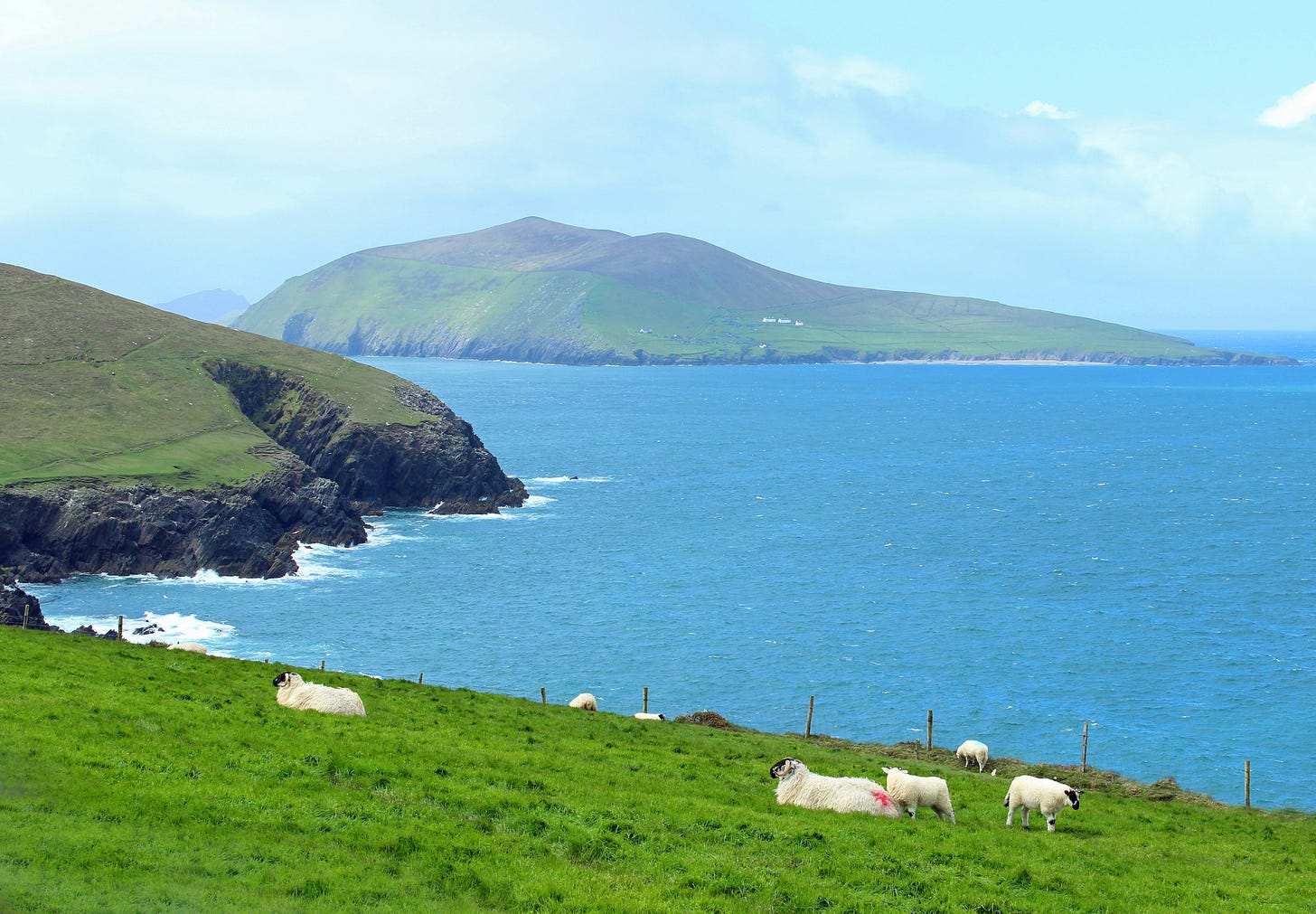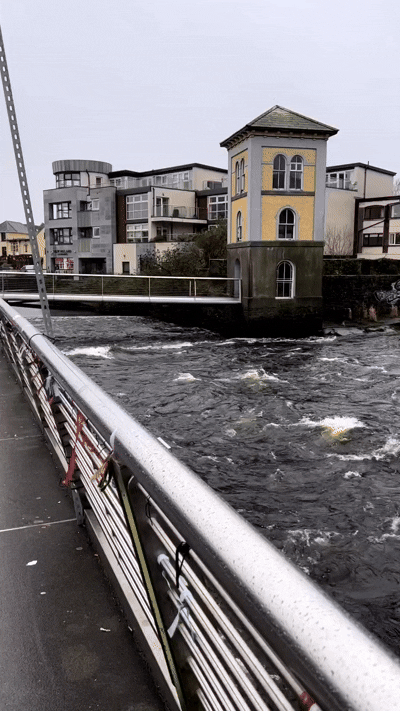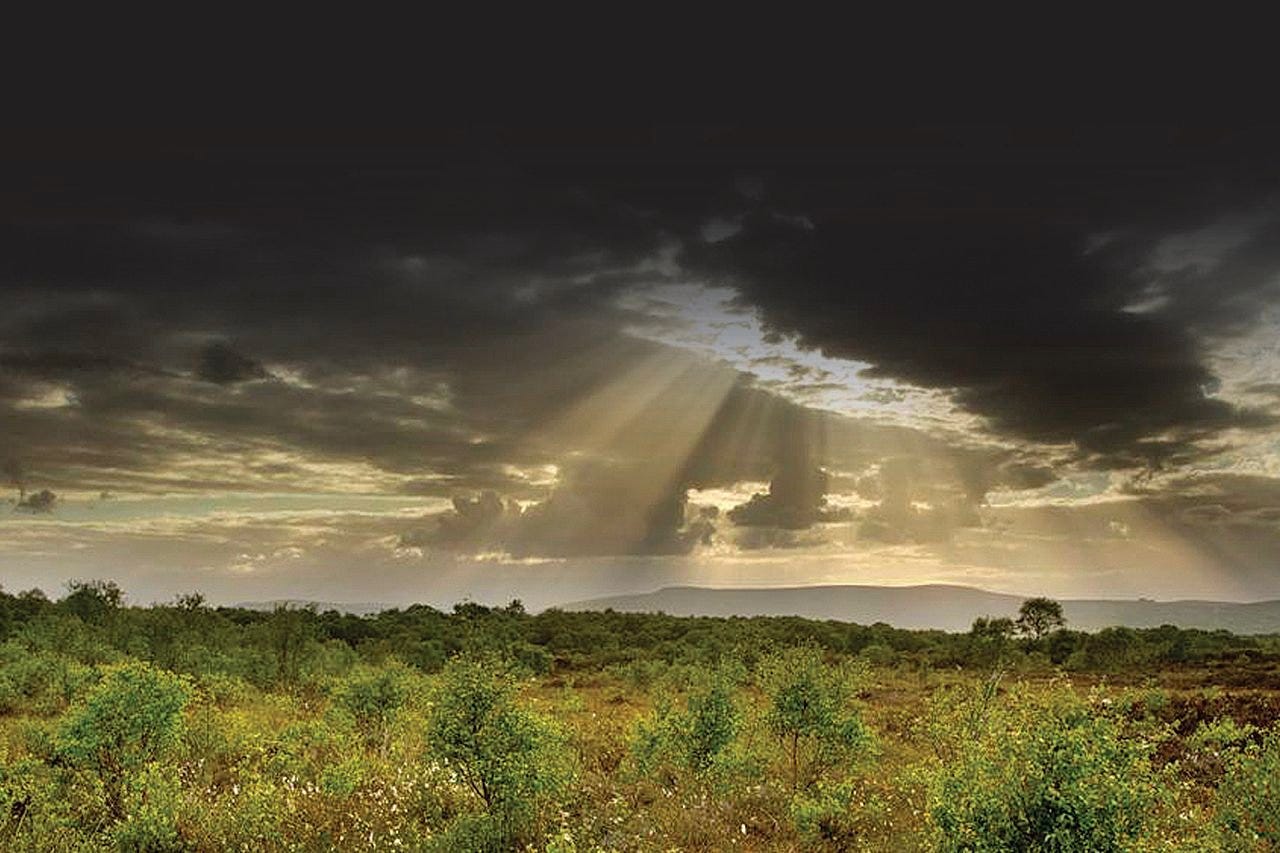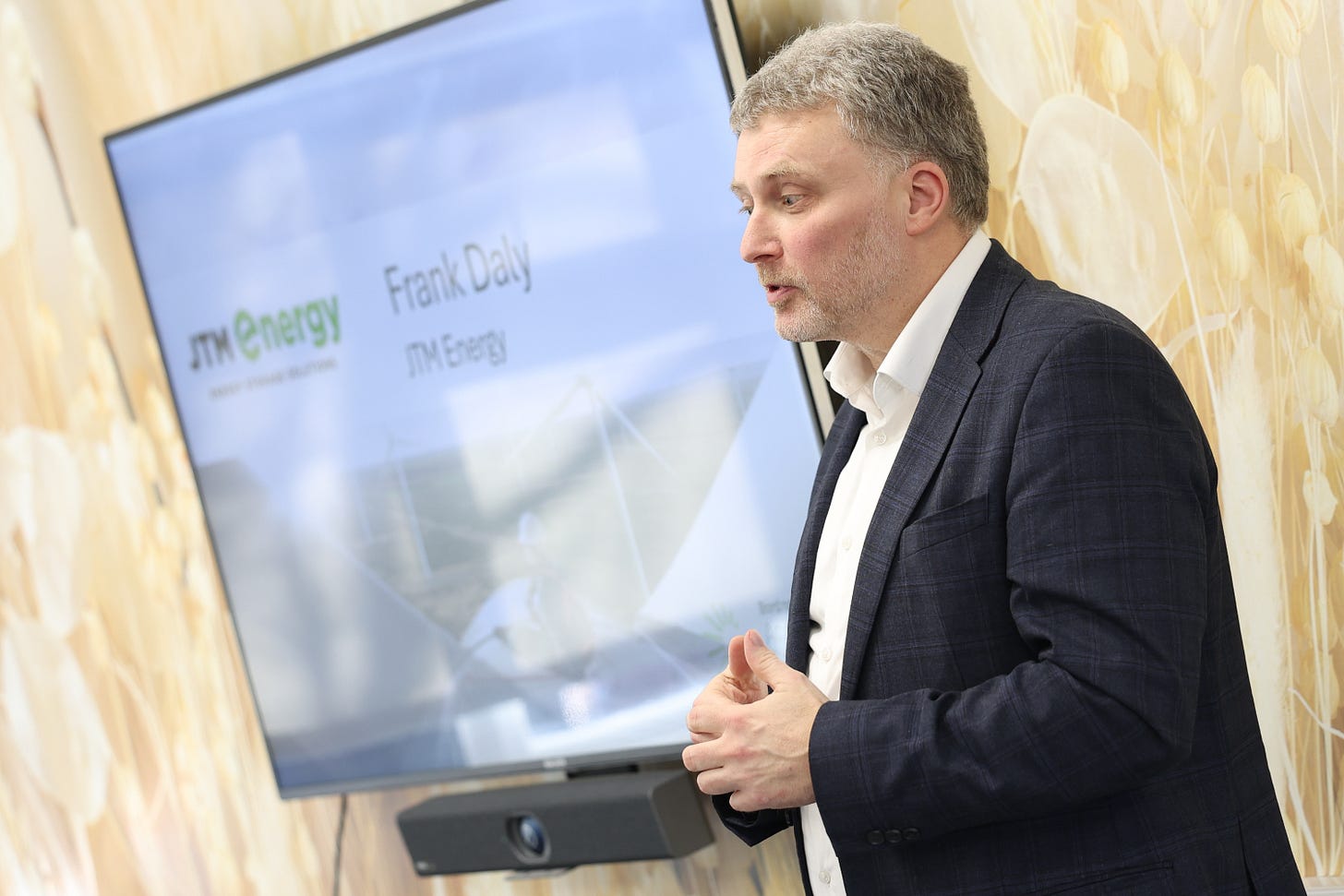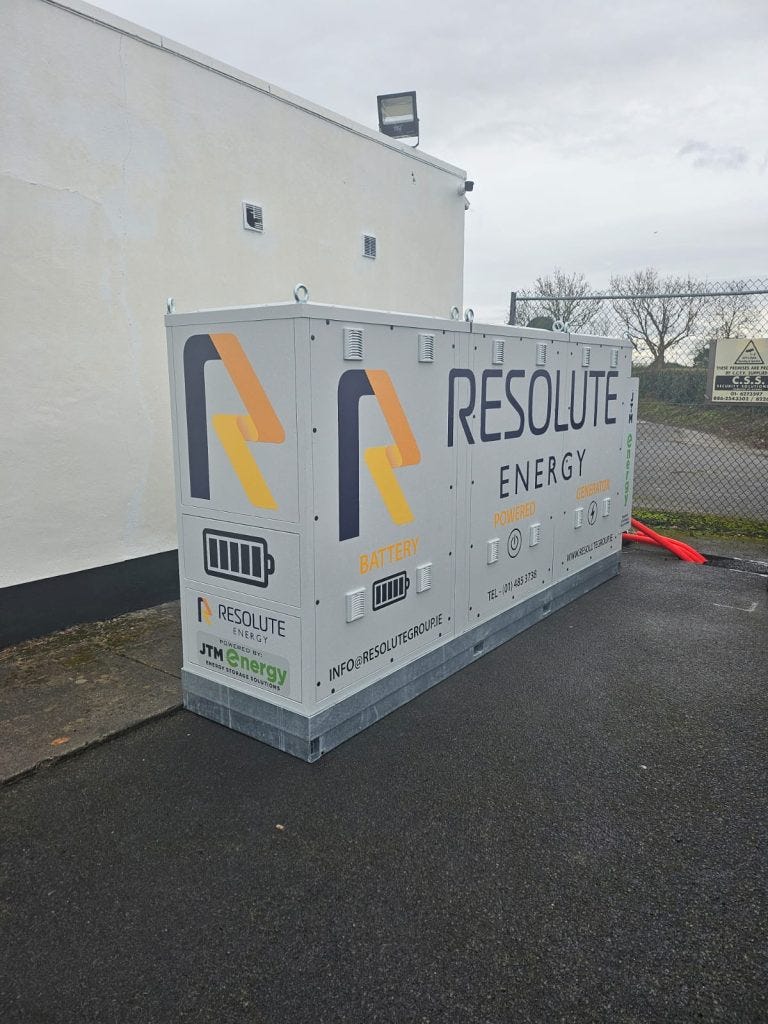Issue 96
Surges and setbacks: PCRE's fresh backing, NTR’s €65m raise, and Arena Capital’s examinership; meanwhile Ireland pushes ahead on biomethane, offshore wind, and green shipping.
Good morning.
It seems that three speaking engagements in the past seven days has caught up with me, and I have entirely lost my voice. Aren’t we all very lucky that SDG Alpha is a newsletter, not a podcast? 🙊
That said, I am due to be presenting next week at Todhchaí Ghorm, an event taking place in Carna, Co. Galway next week, dedicated to ocean sustainability, marine conservation, and Ireland’s emerging blue bioeconomy. It’s free, and there’s still a few tickets available if you want to come along and hear me share lessons learnt from building a climate tech ecosystem with BnM and Accelerate Green, and more about what we’re developing with Resolve Ventures.
I welcome any and all recipes and suggestions for medicinal ways I can use whiskey to recover by next Tuesday!
If you’re interested in learning more about the Accelerate Green programme, but can’t make it to Carna, fear not! We’re also hosting a webinar on the same evening (Oct 7th) as part of the Accelerating Green Ambition series, where my colleague Alan Costello will be joined in conversation by Alex Grubb, Exec Director for Clean Energy at Microsoft. Part of the Microsoft EMEA Energy & Resources team based out of Dublin, Alex works with some of the largest Power & Utilities companies in Europe to help them on their digital transformation journey through Cloud & AI. Definitely a timely topic!
Right: time to batten down the hatches, pop on the kettle, and let Storm Amy howl while you catch up on all the news below!
Here’s the news round-up for Issue 96:
Infrastructure + Energy
Ireland’s fifth renewables auction (RESS 5) has provisionally awarded 1.08 GW of new capacity, mostly solar (860 MW) with wind securing 219 MW. Prices nudged upwards, with an overall average of €98.81/MWh compared to €96.85/MWh in RESS 4. Wind projects cleared higher this time (€96.56/MWh vs ~€90.47), while solar bids came down slightly (€100.63/MWh vs ~€104.76), showing that cost pressures are hitting technologies differently. The total capacity awarded is about 19% below RESS 4, and the auction’s targeted energy output (1,500 GWh) falls short of what was achieved last time (over 2,070 GWh). Solar’s dominance is holding firm, but wind’s reduced share may point to planning or grid constraints, or simply tougher economics. Overall, the results underline both the resilience and the pressure points in Ireland’s onshore renewables build-out.
Statkraft has confirmed it will not bid for the Tonn Nua offshore wind site in the upcoming ORESS auction, citing a strategic review of its Irish plans. The decision follows Corio Generation’s earlier withdrawal from the Sceirde Rocks project, raising questions over investor appetite for sites with deeper seabeds and higher costs. It’s a reminder that while Ireland’s offshore ambition is vast, securing capital for complex projects remains a challenge.
Galway City Council has secured €3.3M in EU funding to install canal-based hydro turbines, aiming to power EV chargers, streetlights, and eventually public buildings while reinvesting surplus revenue into local climate projects. The Corrib is certainly a powerful body of water, so it will be interesting to see how they’re able to harness it!
The Kildare Innovation Campus has signed a three-year corporate PPA with Flogas, securing renewable energy from the Cuillalea Wind Farm in Mayo. The deal will cut 2,000 tonnes of CO2 annually while giving the campus fixed-price energy and helping it position as Ireland’s first carbon-neutral science and technology hub.
Annaholty Green Energy has applied for planning permission to build a new biogas facility in Birdhill, Co Tipperary, capable of generating up to 40 GWh of renewable gas annually—enough to power around 3,200 homes. The plant, which would inject biomethane directly into the national gas grid, mirrors the company’s existing operation in Limerick and aims to cut emissions by replacing fossil fuels with a sustainable alternative. Tipperary County Council is expected to decide on the application by late November.
A major new wind farm proposal has been lodged with An Coimisiún Pleanála for nine turbines spanning Laois, Offaly and Kildare, each more than double the height of Ireland’s tallest building. The €150m-backed project from Dara Energy, whose largest shareholder is Inis Onshore Wind (linked to Temporis Aurora), would operate for 35 years, requiring six hectares of forestry clearance and 11km of new underground grid connection, with submissions open until 21 November.
If you’ve driven the M7 lately you’ll have seen Evergreen’s striking new AD plant rising outside Monasterevin, set to inject biomethane directly into the national grid by next summer. The Irish Farmers Journal takes you inside the site for a closer look at the technology, feedstocks, and farmer partnerships that could shape Ireland’s biomethane future—well worth watching the short feature.
Finance + M&A
Power Capital Renewable Energy has secured a $381m financing facility from Eiffel Investment Group, structured as a bond on the Vienna Stock Exchange, to refinance existing debt and deliver 330 MW of new solar and storage projects by early 2026. Building on its recent equity backing from Infranity and Omnes, the deal strengthens PCRE’s platform to scale its 5GW+ pipeline.
ePower has raised €30m in debt and equity to expand its ultra-fast EV charging network across more than 200 sites in Ireland and grow its solar-powered infrastructure. The funding round, backed by Impax Asset Management and Dunport Capital, marks the company’s largest to date and reflects rising demand for sustainable transport and energy solutions.
Irish climate-tech firm Platmech has secured €2m in funding and signed an exclusive deal to launch TCL’s heat pump range in Ireland. The partnership combines TCL’s global engineering scale with Platmech’s local expertise, aiming to meet surging heat pump demand driven by climate targets, rising energy costs, and EU refrigerant phase-outs.
The L&G NTR Clean Power Fund has acquired the 105-MW Ballydonagh solar project in County Galway from RES, marking its tenth Irish deal and boosting its portfolio here to over 430 MW. With construction slated for 2027, the project adds to a growing pipeline of wind, solar, and storage assets that now totals more than 1.1 GW across Europe.
Cavan-based Galetech Group has taken a 50% stake in Blade Technical Services, a specialist in turbine blade inspection and repair, strengthening its fast-growing Operations division. The deal adds to Galetech’s integrated renewables services platform alongside subsidiaries like Adamas and Optigear, giving BTS the scale to run larger and more complex campaigns across Ireland and the UK. It’s another move in Galetech’s strategy to consolidate a leading portfolio of renewable energy services.
The Government has announced €33m in funding for eight new projects under the Disruptive Technologies Innovation Fund, bringing total support to €455m since 2018. Among the latest awards, Exergyn is advancing energy-efficient cooling tech for data centres, while GlasPort Bio is tackling farm emissions through nutrient efficiency — two strong examples of climate innovation in action.
Policy + Regulation
The Government has unveiled an Offshore Wind Energy Clearing House, chaired by the Taoiseach’s department, to “support and reinforce” the existing Offshore Wind Delivery Taskforce. Framed as a high-level forum to tackle barriers to development, it raises the question of whether Ireland is streamlining delivery—or simply adding another layer of bureaucracy with a new name.
Northern Ireland’s renewables sector has welcomed the launch of the Renewable Energy Price Guarantee, a Contract-for-Difference style scheme that promises 15 years of price stability for new wind and solar projects. RenewableNI says it will unlock stalled investment, create rural jobs, and help deliver on the 80% by 2030 renewable target—but stresses urgent action is still needed on grid, planning, and storage to make the ambition real.
Ireland is set to ratify the High Seas Biodiversity beyond National Jurisdiction (BBNJ) Agreement, pushing global ratifications past the 60-country threshold needed to bring the treaty into force. The move commits Ireland to new marine protected areas, stronger environmental assessments, and benefit-sharing rules—framed as a landmark in ocean governance but one that will test how quickly ambition can translate into action on the water.
Ireland’s Department of the Environment has opened a public consultation on the design of its Social Climate Plan, part of the EU’s Social Climate Fund framework. The survey invites citizens and organisations to share views on how best to direct funding to support households, transport, and communities through the energy transition, while addressing energy poverty and social inclusion. Deadline for submissions is COB on Thursday, 23 October.
Northern Ireland has launched its first-ever peatland protection strategy, setting out 26 actions to restore all semi-natural peatlands to functioning ecosystems by 2040. Peatlands cover 12% of the region and hold more than half of its soil carbon, but with 86% degraded, they are now emitting carbon instead of storing it. The plan includes restrictions on peat sales, a wildfire strategy, and major restoration funding, but conservationists caution that without stronger legal protections—currently covering just 10% of habitats—these internationally important landscapes remain at risk.
Over £4.6m has been approved for 736 Northern Irish farmers under the new Farming with Nature Transition Scheme, designed to support biodiversity, carbon sequestration, and cleaner water while keeping farms productive. Backed by DAERA, the scheme marks a shift toward “public money for public goods” in agriculture, echoing wider European reforms. With another round planned for 2026, the programme signals a long-term commitment to embedding nature-friendly practices in farming.
So, this isn’t exactly Policy, but it sure is Governance & Enforcement: Inland Fisheries Ireland seized over 1,000 illegally harvested oysters in Kenmare Bay, a Special Area of Conservation, after intercepting two vehicles carrying undersized stock. The oysters were returned to the coast, and a prosecution file is being prepared against those involved. More of this please!
Innovation + Technology
The Shared Island Bioeconomy Demonstration Initiative is backing cross-border projects that pilot new agri- and marine-based bioeconomy solutions, with €9m in funding drawn from the Shared Island Fund and agriculture departments north and south. Aimed at SMEs, researchers, producers, and local authorities, the scheme requires North/South collaboration and targets innovation in both the agri-bioeconomy and blue bioeconomy. Successful proposals from the 2024 call are expected to be announced in 2025.
Dublin Offshore has secured a major milestone with DNV approval for the design of its Load Reduction Device (LRD), a rare global certification win for an Irish innovation. The recognition strengthens Ireland’s position in offshore wind supply chains and signals confidence in homegrown technology that can cut costs and risks for floating wind projects worldwide. It’s a boost for both the local ecosystem and Ireland’s wider offshore wind ambitions.
UCD and Met Éireann have launched the €5m Aimsir Centre to develop AI-driven forecasting tools as Ireland faces more frequent and extreme weather events. Bringing together over 60 researchers, the centre will use historic and real-time data to improve accuracy, train a new generation of climate scientists, and strengthen resilience against flooding, heatwaves, and coastal risks.
Arrabawn-Tipperary co-op has been chosen for a feasibility study testing a cooperative model for regional biorefineries, led by ICOS with Climate KIC and backed by government, EU and industry partners. The Comhar BIA initiative will examine how farmer-owned facilities can convert dairy and agri by-products into renewable energy, fertilisers and bio-materials, creating new income streams while driving rural decarbonisation. The study, due by late autumn, aims to set the groundwork for Ireland’s first co-owned biorefinery and a scalable model for the wider bioeconomy.
Soltec, founded in Mullingar in 1994, has grown from recycling garage waste solvents into a circular economy leader treating 7,000 tonnes of hazardous waste annually. Under CEO David Corcoran, the company has invested €6.8m in a new facility, doubled its workforce, and is now developing advanced distillation technologies to supply European markets — turning hazardous waste into products like paint thinners, sanitiser, and even coal alternatives for cement. Great interview here in ThinkBusiness.
DCU has unveiled the driving model of Ireland’s first solar racing car, built by students across the university as part of the DCU Solar Racing project. The team now has its sights set on the 2026 Bridgestone World Solar Challenge, a gruelling 3,000 km test across the Australian outback that doubles as a global showcase for sustainable mobility and engineering innovation. The launch highlights both the technical achievement and the ambition to put Irish talent on the world stage of renewable transport.
Events + Community
SEAI has opened registration for its 2025 National Energy Research and Policy Conference, set for 9 October in Dun Laoghaire. This year’s theme, The Future of Integrated Energy Systems in Ireland, will bring together policymakers, researchers, utilities, and community leaders to explore how renewables, electrification, digitalisation, and storage can be woven into a resilient energy future. Expect research sprints, policy discussions, and workshops designed to link innovation with systemic change.
As part of Climate Action Week, the Climate Ambassador programme is running a series of engaging in-person events around the country. Two in Dublin stand-out: on Wednesday 15 October, a workshop on facilitating inclusive climate dialogue will share practical tools—from walking debates to socratic hotseats—for ensuring every voice is heard in climate conversations. Two days later, on Friday 17 October, the focus shifts to a lighter note with Climate Games Night, featuring climate-themed games, community connection, and (importantly) donuts.
And finally, the Dublin Climate Dinner, a monthly meet-up at Cornucopia Wholefoods, returns next week, bringing together climate-aware people from across the city for casual conversation, community building, and shared food. Founded in 2023, it welcomes both those already working in sustainability and social justice, as well as newcomers keen to connect with like-minded peers. A small donation secures your spot and helps cover the table.
Three, Sixty Interview
To close out the issue, it’s time for “Three, Sixty”, where we pose three questions on the theme of sustainability to an impact entrepreneur or innovator, to get a better understanding in sixty seconds of how they’re working to achieve the SDG targets.
For Issue 96, I spoke with Frank Daly, Commercial Director of JTM Energy, another recent participate from the BnM Accelerate Green Grow programme.
On a personal level, what impacts of the climate + biodiversity crisis are you most concerned about?
I find the loss of wildlife to be the most concerning impact of the climate and biodiversity crisis. A 2024 WWF report estimated that between 1970 and 2020 there was been a 73% decline in wildlife populations, driven by polluted freshwater, rising sea temperatures and deforestation. And what we’ve done to our ecosystems with plastics is just shocking. Micro-plastics, which have been polluting our seas and entering our food chains are now understood to be airborne. It’s not yet known what health risk this will present to the younger generations in particular, who will grow up breathing these in all their lives. The changes we make now need to be quantum leaps. Regrettably, particularly in the US, there seems to be a rowing back on climate action when we can least afford it.
Which of the SDGs does JTM Energy best align with?
JTM Energy manufactures a range of battery energy storage systems — from compact single-phase units suitable for residential or light commercial applications, to industrial and construction grade energy storage solutions; designed to cut emissions, lower costs, and keep operations running.
On construction sites, our off-grid systems cut diesel generator run-time by over 85%. The BESS units power cranes and site compounds, with generators only needed for recharging. In so doing, we reduce generator low load/no load operation and dramatically reduce the consumption of diesel on sites.
In on-grid applications our systems provide a simple plug and play solution to integrate renewable energies such as solar PV, while optimising their use.
For the above reasons we best align with SDG 7 (Affordable and Clean Energy), but we could also argue we align with SDG 11 (Sustainable Cities and Communities) given our systems reduce emissions, air pollution and noise from diesel generators. Our strapline says it all … we assist construction companies “sustainably build sustainable buildings”!
How does your business model enable the transition to a low carbon, or more sustainable future?
Regardless of whether our customers purchase or lease our BESS units, we offer continuous monitoring through our own dashboard, which we designed to collect data on a one second basis. This granularity of data provides us with insights into the energy profile of our customers, especially peaks that might only last a few seconds, that none of our competitors provide. It means we can advise on actions the customers can take to reduce their demand and optimise battery performance.
Construction companies that are accustomed to running diesel generators traditionally don’t care about their power demand because once they switch on the generators the supply is “sorted”, no further actions are required. When a battery arrives on site and they’re being fed with the insights we provide, there is a complete change of attitude. Site managers become acutely aware of their demands and almost evangelical about reducing their loads and getting the most out of their battery.
As mentioned before, we are consistently achieving reduced generator operation of 85% and associated diesel reduction. One site with multiple units has reported estimated diesel savings of 87%. Approximately 40 million litres of diesel is consumed by generators in the Irish construction sector annually, and 14 billion litres across the EU. Imagine how much more sustainable the industry could be it embraced batteries on a wholesale basis. We feel it’s only a matter of time.



